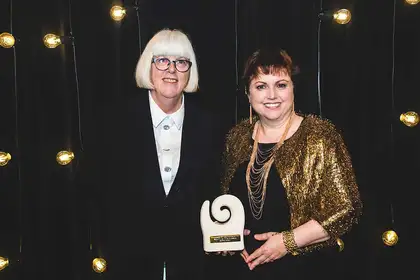
New Thinking Gold Award winner Mary O'Hagan with Massey University Vice-Chancellor Professor Jan Thomas.
An innovative mental health project led by campaigner Mary O’Hagan has been recognised by the Wellington community.
Ms O’Hagan was awarded the Massey University sponsored New Thinking award at the 2017 Wellington Gold Awards, an annual event celebrates the best of Wellington business.
Ms O’Hagan received the award at the event in Wellington on Thursday night, in recognition for her work in providing an innovative response to social, economic, cultural and environmental issues, including those that affect tangata whenua.
Ms O’Hagan, who created PeerZone – an international social enterprise that provides resources and support for people affected by mental distress – says she feels “really honoured” by the award. “It came out of the blue, and I think it’s really good for helping to raise awareness and a sense of social inclusion around mental health issues in the community by recognising the efforts of someone who has had lived experiences in the mental health system.”
A former mental health services consumer herself who has been involved in mental health and disability issues for 30 years, including as one of three commissioners at the Mental Health Commission from 2000 to 2007, she has written about her own struggles in her book; Madness Made Me: A Memoir (2014).
Ms O’Hagan, who was made a Member of the New Zealand Order of Merit in 2015, says the potential for people who have had mental health issues and been through the mental health system to help support others is a valuable and largely untapped resource. Her organisation is seeking to address this.
The current medically slanted model that focuses on treating acute mental health problems through a “narrow” psychiatric model is often ineffective and costly, she says. While medication has a role, it can be harmful, such as in the case of anti-psychotic drug side effects, which she says can be “life-shortening.”
Although she acknowledges there have been improvements in much-needed community-based services, these tend to be of the “clip-on” variety. Providing more community-based residential respite would be more cost-effective and beneficial to people in crisis than hospital beds, she says. Meanwhile, too many people do not receive support treatment until they reach crisis point. “Those who are admitted into acute psychiatric units can be re-traumatised by the experience of being put into isolation, locked up, highly medicated and warehoused with a lot of other people who are distressed.”
Another PeerZone project underway is the creation of an online app to provide easily accessible and immediate help for people facing mental health problems. The app will create support circles where people can text, share a self-rating with their supporters and find advice.
Since 2013 PeerZone has trained over 250 peer facilitators to deliver its workshops in New Zealand, Australia, Canada, the United Kingdom and the United States, and Ms O’Hagan hopes to introduce mental health peer support by and for colleagues in workplaces. Such a scheme has already been running at Weta Workshop.
Previous winners of the New Thinking award have included JD Trask in 2015 (software developer) and Kendra Ross in 2016 (director of DUO and leading expert in cybersecurity).
The New Thinking Award in association with Massey University recognises a Wellingtonian who in their chosen enterprise has taken or demonstrated their best in intellectual and practical application to the rest of the world.